See also
- Slave Auction Block, Fredericksburg, a large stone in Fredericksburg, Virginia, used as an auction block in slave auctions
- Auction block
The Auction Block may refer to:
A slave is an individual held in forced servitude.
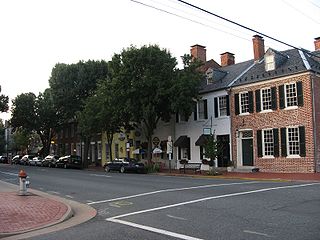
Fredericksburg is an independent city in Virginia, United States. As of the 2020 census, the population was 27,982. It is 48 miles (77 km) south of Washington, D.C., and 53 miles (85 km) north of Richmond. The Bureau of Economic Analysis of the United States Department of Commerce combines the city of Fredericksburg with neighboring Spotsylvania County for statistical purposes.
Dummy may refer to:
Sold is the past tense of selling, which is providing or giving away goods or services for a price.
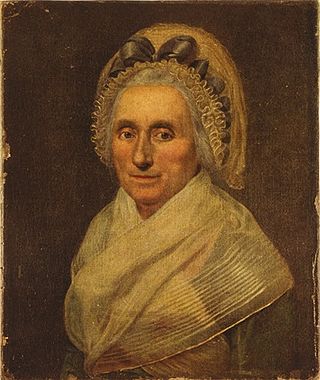
Mary Washington was an American planter best known for being the mother of the first president of the United States, George Washington. The second wife of Augustine Washington, she became a prominent member of the Washington family. She spent a large part of her life in Fredericksburg, Virginia, where several monuments were erected in her honor and a university, along with other public buildings, bear her name.
The United States National Slavery Museum was an unfunded proposal for a museum to commemorate American slavery.
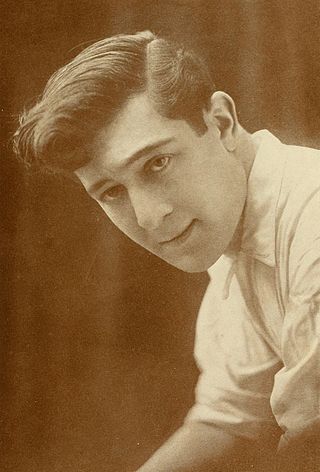
Hobart Henley was an American silent film actor, director, screenwriter and producer. He was involved in over 60 films either as an actor or director or both from 1914 to 1934.

A number of film adaptations of Harriet Beecher Stowe's 1852 novel Uncle Tom's Cabin have been made over the years. Most of these movies were created during the silent film era. Since the 1930s, Hollywood studios have considered the story too controversial for another adaptation. Characters, themes and plot elements from Uncle Tom's Cabin have also influenced a large number of other movies, including The Birth of a Nation (1915), while also inspiring numerous animated cartoons.
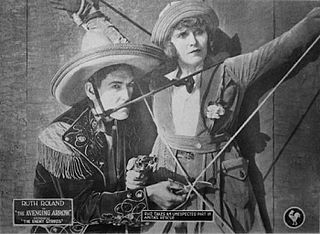
The Avenging Arrow is a 1921 American silent Western film serial directed by William J. Bowman and W. S. Van Dyke. Its 15 episodes are now considered to be lost.

The Auction Block is a 1926 American silent comedy film directed by Hobart Henley. The film stars Charles Ray and Eleanor Boardman. It is written by Fanny and Frederic Hatton and is based on the novel of the same name by Rex Beach.
Scramble, Scrambled, or Scrambling may refer to:

Uncle Tom's Cabin is a 1927 American synchronized sound drama film directed by Harry A. Pollard and released by Universal Pictures. While the film has no audible dialog, it was released with a synchronized musical score with sound effects using the Western Electric sound-on-film process. The film is based on the 1852 novel Uncle Tom's Cabin by Harriet Beecher Stowe and was the last version filmed without audible dialogue. This film is important historically as being Universal's first sound feature.

Uncle Tom's Cabin was a 1918 American silent drama film directed by J. Searle Dawley, produced by Famous Players–Lasky Corporation and distributed by Paramount Pictures under the Famous Players–Lasky name. The film is based on Harriet Beecher Stowe's 1852 novel Uncle Tom's Cabin and George Aiken's eponymous play.
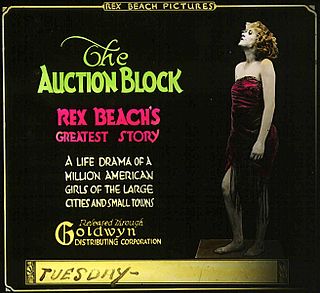
The Auction Block is a 1917 American silent drama film directed by Laurence Trimble and starring Rubye De Remer. The film was produced by Rex Beach, upon whose novel, The Auction Block, the film is based. It is not known whether the film survives. The film was remade as a comedy in 1926 by Metro-Goldwyn-Mayer starring Charles Ray and Eleanor Boardman.

Slave Labour is a mural that was painted by a British graffiti artist, Banksy, on the side wall of a Poundland store in Wood Green, London in May 2012. The artwork is 48 inches (122 cm) high by 60 inches (152 cm) wide, and depicts an urchin child at a sewing machine assembling a bunting of Union Jack patches. The work was a protest against the use of sweatshops to manufacture Diamond Jubilee and London Olympics memorabilia in 2012.

Ravished Armenia, also known as Auction of Souls, is a 1919 American silent film based on the autobiographical book Ravished Armenia by Arshaluys (Aurora) Mardiganian, who also played the lead role in the film. The film, which depicts the 1915 Armenian genocide by the Ottoman Empire from the point of view of Armenian survivor Mardiganian, who plays herself in the film, survives in an incomplete form.
A slave market is a place where slaves are bought and sold.
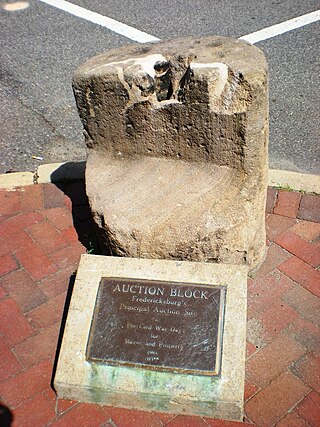
The Slave Auction Block in Fredericksburg, Virginia is a large stone that was used as an auction block in slave auctions. It was located on the corner of William Street and Charles Street, and is listed on the National Register of Historic Places as part of the Fredericksburg Historic District.
The International Coalition of Sites of Conscience (ICSC) is a global network of historic sites, museums, and memorials that are dedicated to promoting and protecting human rights across the world. The Coalition is registered as a non-profit association in the United States. The International Coalition of Sites of Conscience is an affiliated organization of the International Council of Museums and maintains consultative status in the United Nations Economic and Social Council.

Peter Farley Fossett was an enslaved laborer at Monticello, Thomas Jefferson's plantation, who after he attained his freedom in the mid-19th century, settled in Cincinnati where he established himself as a minister and caterer. He was a captain in the Black Brigade of Cincinnati during the Civil War. Fossett was an activist for education and prison reform. He was a conductor on the Underground Railroad. His remembrances, Once the slave of Thomas Jefferson, were published in 1898.